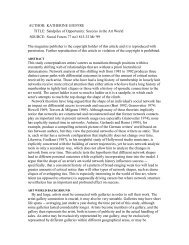Incumbents, innovation, and competence - Cultural Policy Center ...
Incumbents, innovation, and competence - Cultural Policy Center ...
Incumbents, innovation, and competence - Cultural Policy Center ...
You also want an ePaper? Increase the reach of your titles
YUMPU automatically turns print PDFs into web optimized ePapers that Google loves.
Catholic Church, Salvation Army) that also fought vigorously against jazz (Leonard,<br />
1962).<br />
While these actions by elites could be ignored by many record companies, dominant<br />
incumbents felt pressure to comply. Not only were they highly visible due to their market<br />
presence, but the leaders were strongly affiliated with the American elite class through<br />
educational, matrimonial, <strong>and</strong> financial ties. Eldridge Johnson, founder <strong>and</strong> president of<br />
Victor, was the top financial contributor to the Republican Party in 1928—whose major<br />
contributors also included the Mellons, Rockefellers, <strong>and</strong> Guggenheims (Overacker, 1933).<br />
Leon Douglass, Victor’s vice president, married into the prominent family that produced<br />
Presidents John Adams <strong>and</strong> John Quincy Adams. Edison, a well-known member of the<br />
business elite, was married to Mina Miller, a member of the Daughters of the Revolution<br />
(Melosi, 1990). The founders <strong>and</strong> executives of Columbia Phonograph included influential<br />
attorneys, graduates of prestigious universities, <strong>and</strong> financiers associated with the US<br />
Supreme Court <strong>and</strong> US House of Representatives (Welch et al., 1994; Who Was Who in<br />
America, 1962).<br />
The identities of the dominant record companies were intimately rooted in the values <strong>and</strong><br />
agenda of the American elite in a period when elites paid close attention to the relationship<br />
between social status <strong>and</strong> the arts. As a consequence, they were influenced by the pressure<br />
to uplift high culture. Accordingly, these companies sought to record high status singers<br />
<strong>and</strong> musicians of European operatic <strong>and</strong> classical music (like Enrico Caruso) who could<br />
demonstrate the companies’ commitment with ‘‘high-class music’’ that ‘‘appeals to the<br />
best class of people’’ (Kenney, 1999: 51).<br />
The historical record shows that constraints on incumbents diminished during the mid to<br />
late 1920s, when jazz’s legitimacy began to improve <strong>and</strong> when incumbents themselves would<br />
produce recordings of jazz ‘‘orchestras’’ that could make claims of cultivating <strong>and</strong> enriching<br />
jazz (Phillips <strong>and</strong> Owens, 2004). Especially notable was the crowning of Paul Whiteman as<br />
the ‘‘King of Jazz’’ in 1923 by Talking Machine World—the same trade publication that<br />
scolded Victor for producing jazz six years earlier—<strong>and</strong> the New York Times (Kenney, 1999;<br />
Gracyk, 2000). Whiteman’s b<strong>and</strong>s featured classically-trained musicians who were largely<br />
‘‘ignorant of black musical styles’’ but ‘‘served as a bridge between the raucous jazz world<br />
<strong>and</strong> that of the small-town brass b<strong>and</strong>s <strong>and</strong> music teachers’’ (Peretti, 1997: 34). Other elite<br />
organizations <strong>and</strong> publications gave a guarded acceptance of Whiteman’s highly orchestrated<br />
form of jazz—including The Etude (in 1924), The Musical Quarterly (in 1926), <strong>and</strong> the<br />
National Federation of Music Clubs (in 1927) (Berger, 1947). While these parties made great<br />
efforts to distinguish between good (‘‘sweet’’) symphonic jazz <strong>and</strong> bad (‘‘hot’’) jazz, we<br />
consider their partial acceptance of jazz as indicating its rising legitimacy (see Lopes, 2002).<br />
3. Competency <strong>and</strong> jazz<br />
D.J. Phillips, D.A. Owens / Poetics 32 (2004) 281–295 285<br />
As economists <strong>and</strong> organizational scholars have noted, incumbents are often less<br />
competent than challengers in the production of radically innovative products (Arrow,<br />
1974; Henderson, 1993). We extend this logic to the production of jazz recordings. Here, a<br />
record company is competent to the extent that it successfully records a jazz tune with<br />
minimal effort. Effort here is measured as the number of ‘‘takes’’ (i.e., attempts) required to









